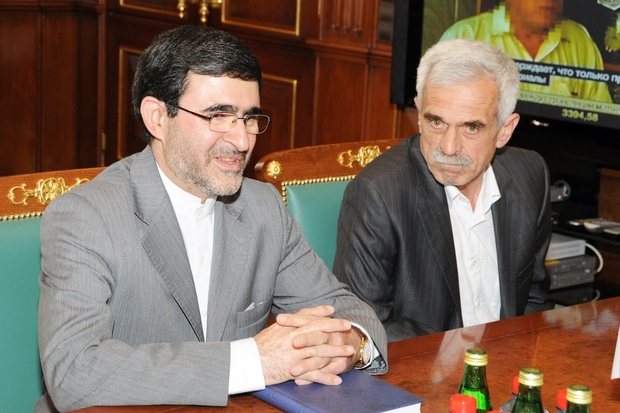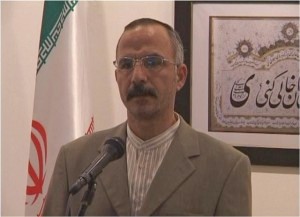Tehran sends a specialist in soft power and hard hand of Moscow to Tatarstan
Consul mess: Iran has changed three diplomatic representatives in Kazan within a year
The next consul has changed in the Consulate of Iran to Kazan 6 months after his appointment. This time 55-year-old Alibeman Eghbali Zarch who managed to work as a diplomat in Eastern Europe substituted Acting Consul Nadali Nadi who was almost noticeable. Realnoe Vremya found out what else the new consul was famous for.
Veteran of Balkan diplomatic campaign
Realnoe Vremya was first to inform that the Consulate General of the Islamic Republic of Iran to Kazan had a new head of the diplomatic mission — Alibeman Eghbali Zarch. According to his work history, the new consul had rich working experience in countries of Eastern Bloc. So, he worked as Iranian ambassador to Albania for three years (from 2007 to 2010). Earlier he was deputy ambassador to Romania (2000-2004).
During his work in Bucharest and Tirana, Alibeman Eghbali Zarch delved into the study of these countries in detail. He is the author of not only the Persian-Romanian and Romanian-Persian phrasebook, monographs but also a number of pieces.
During his work in Bucharest and Tirana, Alibeman Eghbali Zarch delved into the study of these countries in detail. Photo: lajme.gen.al
The Balkan media were also interested in the personality of Alibeman Eghbali Zarch. In 2010, Alibeman Eghbali Zarch was noticed by analysts of the Serbian Internet portal Serbianna. The piece where Zarch was spotted was dedicated to the so-called soft power of Iran that gradually reached the Balkans and organisations that helped it. The author of the piece thinks that Iran tried to enter the Balkan region by opening religious and educational establishments and different non-state organisations from the early 90s and civil wars in Yugoslavia. In the very article, Zarch's activity is demonstrated as one of the examples of the use of soft power in Albania.
We mean the Albania – Iran Friendship Association. It was founded by former Iranian Ambassador to Albania Alibeman Eghbali Zarch. Bedri Bylyku is the head of the association. The association managed to attract important members of the scientific community of Albania such as Eduart Sulstarova, Emil Lafe и Jorgo Bulo. Only high-level scientists, businesspeople and politicians were the target audience of the association.
Later Alibeman Eghbali Zarch served as a senior expert of the deputy head of the Ministry of Foreign Affairs of Iran on Europe and America.
Geopolitical triangle
Curiously, in 2014, a specialised newspaper Iranian Diplomacy published an article written by Ali Beman Eghbali Zarech headlined Capitalism – Neonationalism – Putinism.
In brief, in the author's opinion, disagreements arising between the heads of Western countries, Russia and Eastern Europe demonstrate the weakness of the leaders of these countries while establishing an artificial balance among pseudo-capitalism, extreme nationalism and Vladimir Putin's aspiration to restore the Russian power and independence.
Capitalism is the first angle of the triangle described by the author. Zarch says that the fixed capitals of the above-mentioned countries are controlled by a very limited group of people. For example, over 70% of the current capital of depressed Ukraine belong to less than 80 oligarchs. In his opinion, almost the same situation is observed in a majority of other Eastern bloc countries, including Russia. And, undoubtedly, the problem of money distribution within the EU also raises fears among experts.
Stronger nationalism is another angle of the triangle. Zarch thinks that it managed to confidently show itself in Ukraine last year because of organised West-backed protests. He also states that nationalism gave birth to Russian separatism and led to the separation of the Crimean peninsula. This is why the West imposed sanctions against Russia.
The renascence of the Russian independence and the growing influence of Russia on the international stage is the third angle of this triangle. Zarch says that Vladimir Putin confidently states about his disagreement with the politics of the West when the Syrian crisis broke out and Western countries tried to topple Bashar al-Assad. So, he started a new stage in the history of international diplomacy and relations between the East and the West. The author also thinks that Russia benefited to the max from the contradictions between Iran and the West on the nuclear programme and separated the European energy market from interesting possibilities and huge oil and gas reserves of the Islamic Republic.

Fourth consul in order
Reza Baghban Kondori headed the consulate when it opened in Kazan in December 2007. In February 2011, Rasul Bagernejad Shayan substituted him on the post of Consul General of the Islamic Republic of Iran to Tatarstan. Earlier he worked in Moscow.
However, then consuls started to change almost every 6 months. Now it has been the third change of the head of the consulate within a year. In the middle of 2015, Rasul Bagernejad Shayan was changed by Mohsen Fagani. His post was occupied by Nadali Nadi in almost 6 months. And now the consulate has got a new head — Alibeman Eghbali Zarch. Each of the three last heads worked as acting consul, not consul general.
Bagernejad Shayan was the most remarkable consul who participated in almost all important events in Kazan who made an impression of being not only a diplomat.
In the Consulate of Iran in Kazan, we were told that they would not comment the reason why the consuls changed. We had not received any answer from the Embassy of Iran in Moscow when the article was published.
Why Iranians are worse than Turks
Political expert and specialist in Eastern studies Gumer Isaev thinks the reason for the change of consuls might be rather technical than political or ideological. 'On the one hand, I think this position is not of strategic importance to the Iranian government. Consul in Kazan is unlikely to be an important moment with due respect and understanding of the relationship between the Republic of Tatarstan and Iran. Probably the most important representative of Iran is the ambassador of Iran in Moscow, to put it frankly. This is why you should look for the reason inside, which is connected with the Iranian Ministry of Foreign Affairs, rather than link it with the result of some Iranian activity in Tatarstan,' the political expert thinks.
A person who knows the work of the consulate also agrees with the version that Kazan is not such a prestigious place. He says that Fagani did not have a great desire to work in the republic because he had chances to have a more interesting post in Tehran.

In Isaev's opinion, the very opening of the Iranian consulate in Kazan is a political issue. At the same time, it indicates that Tatarstan as well as Kazan was estimated as an important city for Iran from the political perspective. 'I think, in general, Iran tried to demonstrate somehow it was not worse than Turkey (Turkey also has a consulate in Kazan). Moreover, Iran itself is trying to pursue an effective policy towards Russia. I mean the Iranian Cultural Centre in Moscow, which is quite active and has many events. Generally speaking, of course, it shows that Iran wants to be seen,' the expert says. By the way, we can note that the first public meeting of the new acting consul in Kazan was exactly with his Turkish colleague Turhan Dilmaç.
From his point of view, as for economic relations, we should not forget that sanctions are lifted, which is an important process for Iran. 'We can say that Iran is going back to the world economy because it is known that the country was imposed sanctions because of its nuclear programme. In principle, its commercial and economic relations were considerably limited. Now it seems that Russian companies have an opportunity to join. Tatarstan companies perhaps can be interesting for Iran as commercial partners,' says Isaev and continues:
'There is a very interesting moment: while Iran was imposed sanctions, Russian companies had an opportunity to sign favourable agreements with Iran taking advantage of this situation. On the other hand, I think many companies were afraid to sign agreements with Iranian companies because of the sanctions.'
